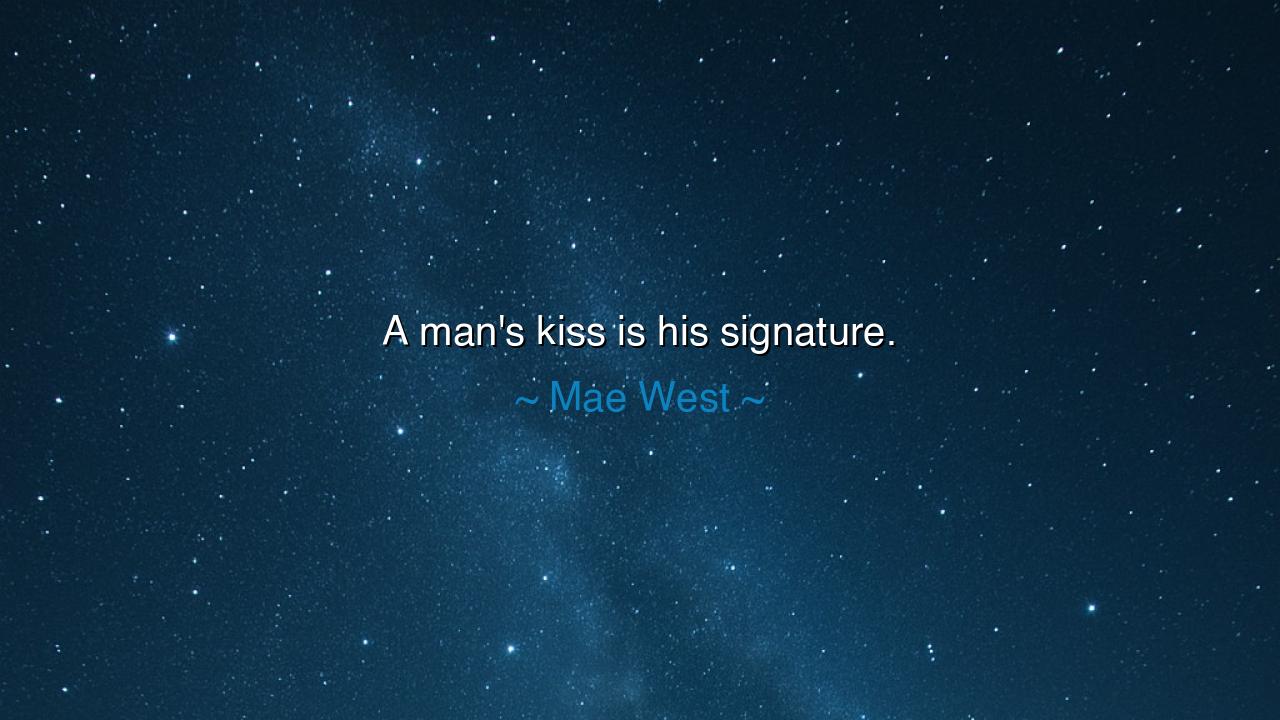
A man's kiss is his signature.






Mae West, the bold and unflinching voice of passion in an age still bound by restraint, once declared: “A man’s kiss is his signature.” In these few words, she gave a truth as old as desire itself: that affection is not merely an act of the lips, but the very seal of the soul. Just as a signature marks the essence of one’s identity and stands as proof of one’s honor, so too does a kiss reveal the truth of a man’s heart—his sincerity, his passion, his character, and the depth of his love. A false signature betrays; so too does a loveless kiss. A true signature binds; so too does a kiss born of devotion.
The origin of this wisdom lies not only in Mae West’s daring wit, but in the long history of the kiss as a symbol of covenant and meaning. Among the ancients, a kiss was not merely an exchange of affection but a pledge—of loyalty, of respect, of intimacy. In Rome, treaties were sealed with kisses. In Christendom, betrayal itself was marked by a kiss, showing how powerful and dangerous the gesture could be. West, with her sharp understanding of human nature, recast this ancient symbol in modern language: the kiss is a man’s “signature,” his personal mark, his unspoken truth.
Consider the story of Abelard and Heloise, lovers of medieval France whose passion shook the very halls of church and school. Their kisses were not hidden caresses but flames that branded their destiny. For them, each kiss was indeed a signature, writing a story that could not be erased, even by tragedy. Their letters, still read centuries later, speak of those moments as proofs of their souls’ union—acts that signed their names upon one another’s hearts forever.
Or ponder the tale of Napoleon and Josephine. When separated by war, Napoleon’s letters burned with longing, yet always returned to the memory of her kiss. To him, Josephine’s kiss was her signature, the mark of her identity as beloved, as queen of his heart. When he felt her drifting from him, it was not her words nor her beauty he lamented most, but the absence of that seal of intimacy which had once bound them. Here we see Mae West’s truth: that the kiss carries the full weight of authenticity, the unforgeable sign of true passion.
The deeper meaning is this: a man may speak words of love, he may give gifts, he may adorn with promises—but it is in the kiss where pretense fades. There the heart betrays itself. A kiss coldly given reveals indifference, even if words speak otherwise. A kiss tender and unhurried reveals devotion greater than words could ever frame. Thus the kiss is not mere affection; it is testimony, as binding as a written name.
The lesson, O children of tomorrow, is that love requires authenticity. Do not let your gestures be empty, nor your touch devoid of meaning. When you give affection, let it carry your truth, for every kiss you offer signs your name upon another’s soul. Ask yourself: What do I wish my signature to say? Will it speak of carelessness and vanity, or of loyalty, passion, and respect? The choice is yours, and the mark you leave will not fade easily.
Practical wisdom follows: let your kisses, your embraces, your every gesture of love, be filled with intention. Do not squander them thoughtlessly. Do not offer them falsely. Give them as you would give your very name, with honor, with authenticity, and with the weight of your heart behind them. In this way, those you love will never doubt the truth of your affection, for they will carry your signature etched within their souls.
Thus Mae West’s words, though cloaked in her playful wit, endure as ancient counsel: “A man’s kiss is his signature.” It is the mark of truth or the brand of deceit, the seal of love or the hollow stamp of vanity. Live, then, so that your every kiss is worthy of your name, and your name is remembered in love.






AAdministratorAdministrator
Welcome, honored guests. Please leave a comment, we will respond soon